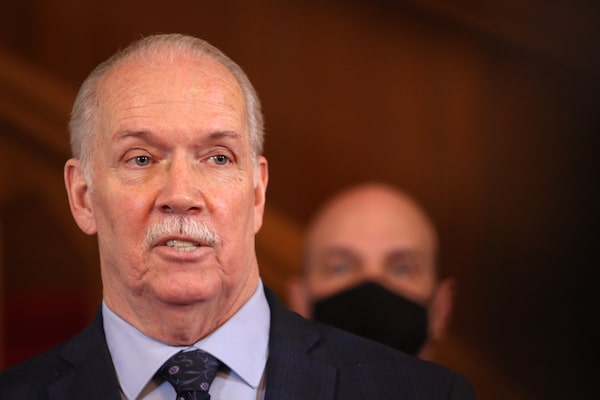
B.C. Premier John Horgan, shown in Victoria earlier this year, says the 'broken' system of fossil-fuel subsidies doesn't fit with his government's climate goals or ensure people benefit from the resources.CHAD HIPOLITO/The Canadian Press
British Columbia plans to end a 19-year-old system of subsidies that provides royalty incentives to spur companies to drill deep wells for natural gas.
The provincial government said there will be a two-year transition starting Sept. 1 to scrap the current system, with no royalty credits being provided to new deep wells. The minimum royalty rate paid to the province will be raised to 5 per cent, compared with the current 3 per cent.
“This overhaul is long overdue and will replace an outdated system,” B.C. Energy Minister Bruce Ralston said during a news conference Thursday.
The province introduced a series of royalty incentives in 2003 for deep wells. Other subsidies date back to the 1990s.
The B.C. government retained two academic experts, Nancy Olewiler and Jennifer Winter, to review the royalty structure and they concluded last year that major changes were needed.
“What we found in reviewing B.C.’s royalty system is that, frankly, it is broken. The current system is overly complex, outdated and is not living up to public expectations in terms of returning a proper share of the value of oil and gas, protecting the environment and providing certainty to investors,” Prof. Winter said.
“The system has been built up to a place where it’s almost incomprehensible to the ordinary British Columbian as to how we got to this place,” B.C. Premier John Horgan said.
Lawsuit challenges B.C. for failing to meet climate action targets
Ben Parfitt, a resource policy analyst at the Canadian Centre for Policy Alternatives, welcomed the move to phase out the deep-well subsidies, but he criticized Mr. Horgan’s NDP government for continuing to generally support the extraction of fossil fuels.
He is concerned about methane leaks from the production of natural gas through hydraulic fracturing, or fracking. Nearly two decades ago, the provincial Liberals led by then-premier Gordon Campbell wanted to spark drilling in northeast British Columbia by providing royalty credits, Mr. Parfitt said.
Amid waning prospects for the Western Canada Sedimentary Basin back then, the province’s subsidies led a flurry of investments to tap into northeast B.C.’s natural gas reserves, with increased activity in areas such as in the Cutbank Ridge play.
“Those credits were set up in the Campbell era to encourage what was then relatively new technology. As the modern-day fracking operations got under way, drilling deep and horizontal wells, and doing the multistage fracking – typical today – was somewhat less typical then,” he said.
Fracking likely to create stronger, more common earthquakes in northern B.C.: study
There were an estimated $3.2-billion in royalty credits last year stemming from deep wells. The B.C. Energy Ministry said credits will expire in four years unless they’re transferred to a new fund focused on land remediation and emissions reductions beyond regulatory requirements.
To get at natural gas reserves has meant drilling to depths averaging 2,200 metres in some areas. The drilling method initially goes straight down and then swings at an angle to burrow horizontally. Drilling tools send electronic signals to the surface, alerting the rig crew about what zone they’re hitting.
Environmental groups such as the Wilderness Committee are worried about the B.C. government’s continuing support for planned exports of liquefied natural gas. LNG Canada’s $18-billion terminal is under construction in Kitimat in northern B.C., with the goal to start exports to Asia in 2025.
Woodfibre LNG is hoping to become Canada’s second LNG export project, aiming to begin construction in mid-2023 at an industrial site near Squamish, located 65 kilometres north of Vancouver. Natural gas prices have jumped this year in North America, while prices in Asia and Europe for LNG also surged after Russia invaded Ukraine in February.
Climate-activist group My Sea to Sky, which opposes Woodfibre LNG, said in a statement that Thursday’s announcement doesn’t amount to a fair return for the province but instead has the effect of perpetuating fracking.
The David Suzuki Foundation said the B.C. government missed a chance to create a new mechanism to share resource revenue with First Nations.
“At a time when rolling back fossil fuel production to meet climate objectives should be top of mind, the revised system continues to favour gas extraction and exports in B.C.,” the foundation said.
We have a weekly Western Canada newsletter written by our B.C. and Alberta bureau chiefs, providing a comprehensive package of the news you need to know about the region and its place in the issues facing Canada. Sign up today.
 Brent Jang
Brent Jang